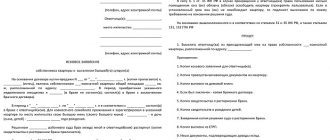Home » Housing disputes » How to evict a relative from an apartment if he is registered in it
3
Situations where just yesterday members of a close-knit family suddenly began to quarrel with each other are, unfortunately, not so rare. The reasons may be different, but the result is always the same - people no longer want to live under the same roof.
It’s good when they can somehow separate and exchange apartments, but this is not always possible. Often the owner of the residential premises is one of them, while others are simply registered or do not have registration in this apartment at all. The owner of the apartment is increasingly thinking about eviction...
Reasons for eviction
If a citizen is registered in a residential building, then he has the right to live there. But often not everyone registered has ownership rights to residential premises, so the owner has the right to file a claim to recognize a relative as having lost the right to reside.
On what grounds can the owner initiate such a claim (Article 35 of the RF Housing Code):
- Termination of family relationships . Usually occurs after the divorce. In this case, if only one of the spouses is the owner, and the other has only registration, the owner can initiate the eviction of the former spouse.
- Long-term absence from the place of registration . This is possible when one of the relatives is registered in a residential building, but actually lives in another and has not appeared at the place of registration for more than six months.
- Non-participation in servicing utility bills . Often the entire burden of paying for housing and communal services falls on one of the family members, while the other does not consider it necessary to pay his part of the rent.
- Relatives do not run a common household . For example, two brothers live, one of them is the owner, the other is simply registered, but they live like strangers, do not communicate with each other, eat separately, that is, in fact, they have turned the apartment into a communal apartment.
- Malicious antisocial behavior of a non-owner . If a family member behaves immorally, causes rows, abuses alcohol, or uses drugs, the owner of the apartment can initiate the eviction of such a relative.
- Deliberate damage to property.
- Sale of residential premises . If the owner of an apartment sells, then all registered residents are required to leave the property and be deregistered.
As judicial practice shows, the court is unlikely to make a decision on eviction on one of the above grounds (except for divorce and eviction of the former spouse). Most often, eviction will require a combination of reasons, for example, the antisocial behavior of a relative and his complete disregard for utility bills.
For example, two stepbrothers live in a three-room apartment: Nikolai and Denis. The apartment is owned by Nikolai, since he inherited it from his mother, while Denis is only registered in the apartment. Nikolai’s family lives with them - a wife and two young children.
Denis has been leading an antisocial lifestyle for a long time, often gathering drunken, noisy groups in the apartment that scare children, and in addition, he often spoils his brother’s property in fits of uncontrollable anger. Denis refuses to move out, since he does not work anywhere and cannot pay for rented housing.
Nikolai consulted with a lawyer, who advised him to sell the apartment and buy another one in return, in which Denis would not have any right to reside. The lawyer did not recommend the option of eviction by court, since Denis does not have a regular income, that is, he is considered low-income, the court may refuse to evict.
Nikolai sold the apartment and used the proceeds to buy another one in a neighboring area. Denis was forced to deregister and move out of the apartment.
In what cases is it not possible to evict?
For some categories of citizens, there are restrictions on eviction from residential premises, even if he is not the owner. You cannot evict a relative, even a former one, if he:
- has the right to use residential premises under the terms of the marriage contract ;
- is a co-owner of the apartment;
- has not reached the age of majority , and it makes no difference whether the child is his own or adopted;
- is a dependent of the owner (disabled or incompetent);
- is unable to find and rent another living space;
- refused privatization in favor of the owner of the apartment (has the right to lifelong residence in the residential premises);
- indicated in the testator's will (for example, a grandmother bequeathed an apartment to her grandchildren, but with the condition that their mother has the right to live in the apartment for life);
- was declared missing , but returned after some period of time;
- orphan;
- single mother.
Of course, life conflicts can be so diverse that the owner will have to initiate the eviction of these categories of persons. The law has restrictions on the eviction of such citizens, but there is no complete ban, so the owner has the right to file a lawsuit against such citizens.
For example, according to the marriage contract, Natalya had the right to live in the apartment of her ex-husband Igor, which she took advantage of after the divorce. For a year, she not only lived in the living quarters herself, but also periodically brought in strangers, men and women, organized noisy holidays, and was in no hurry to share utility bills with her ex-husband.
Igor repeatedly tried to talk to his ex-wife so that she would stop disturbing his peace and pay her share of utility bills, he warned her that he did not intend to tolerate her behavior for a long time, in response, she showed him the marriage contract and stated that he would not be able to get rid of her .
A year later, the ex-husband accidentally found out that Natalya had inherited a two-room apartment from her father and was renting it out. He warned his ex-wife in writing that if she did not change her behavior, he would be forced to initiate her eviction to the living space she had inherited, but she, as before, ignored his warning.
Igor filed a claim to deregister and evict his former relative, since she violates his rights and has alternative housing. The court, having considered all the materials of the case, decided to evict the defendant.
How to evict your father from your apartment?
Question:
I am the owner of a 2-room apartment, in which my husband, two minor children and my father, a chronic alcoholic, live. We are currently expecting our third child. I suggested that my father buy a room or a house for separate living. At first he agreed, but now he refuses, since he became disabled in January (his arm was amputated), but he still has not registered his disability. What should we do to resolve the issue of father's eviction?
Lawyer's response:
The key point in this situation is that the apartment is located in your property. And, accordingly, the norms of housing legislation give you the right to dispose of property at your own discretion (Article 30 of the Housing Code of the Russian Federation).
Of course, you should not forget that the father is a member of your family (Clause 1, Article 31 of the RF Housing Code) and, given his residence in the apartment, most likely he acquired the right to use it. You do not indicate whether the father is registered in the apartment or not, however, this point is one of the key ones. So, if he is not registered, then the issue of eviction can be resolved through the court, while the right to purchase and provide him with another housing will depend only on your desire.
If the father has a residence permit, and even more so the apartment previously belonged to him (under any conditions), and subsequently the ownership is registered or re-registered in your name, then evicting him from the apartment will only be possible through the court and you will have to prove your right to do so. But if the father is against voluntary eviction and deregistration, then you have no other options.
You indicate that you offered your father housing and he agreed to move, but at present he is not satisfied with such conditions. There must clearly be appropriate confirmation of such facts in order for these circumstances to have significance when considering the case in court. If you do not have supporting documents, then you must immediately submit a written proposal to your father about your desire to purchase him a new living space for separate living. Offer a time frame within which he will have to respond. Hand it to him against signature or send it by registered or certified mail with notification. Considering that the sending and receiving addresses are the same, do not receive this letter yourself.
Alternatively, you can find housing into which the father will presumably be moved. Prepare documents confirming your marital status, including:
- documents for the apartment,
- children's birth certificates,
- a certificate from a medical institution confirming your pregnancy.
If there are documents confirming or testifying to the father’s abuse of alcoholic beverages, then they are also required.
File a statement of claim in accordance with the requirements of Articles 131-132 of the Code of Civil Procedure of the Russian Federation. After the expiration of the period established in the letter to the father, go to court with a claim, which you justify with any facts indicating the impossibility of living together:
- you are married, you have a stable family relationship,
- your marital status, that is, you have 2 minor children, you are expecting a third child,
- in a two-room apartment you are accommodated in such a way that your father occupies a separate room, and your family has to huddle in another room,
- the father abuses alcohol, which poses a potential threat to minor children.
Please also indicate that you made an offer to provide housing for your father, both previously and now, which he refused.
In accordance with Articles 87-88 of the RF IC, you may be obligated to provide and care for disabled parents in need of help. If the father claims that you are evicting him while he needs care and material support, it will be problematic to recognize his claims as justified, since you are caring for him, do not refuse it and are ready to bear the costs, as evidenced by your intention buy him an apartment.
Ask your question to a lawyer!
Some other answered questions from the Housing Legislation section:
Ownership of real estate in a civil marriage.
Three years ago, a cohabitant entered into an agreement to purchase an apartment in a building under construction. I invest my money in monthly payments. The completion of construction should take place in June, and the registration of our marriage – in September...
How to register an apartment for a child?
Dad died suddenly. They lived with their mother in a privatized apartment, registered in their mother’s name. Now she is seriously ill. I am the only daughter, I live separately in an apartment privatized for me...
Is it possible to evict a young child and a mother on maternity leave from an apartment?
Can we be evicted for debt from a cooperative apartment where a young child is registered and I am on maternity leave? The chairman of our house does not want to listen to anything. He says: “either the whole debt at once, or I’ll evict you through the court”...
Is it possible to sell a share in an apartment without notifying the other owner?
Can I sell my 1/2 share in a privatized one-room apartment (38.6 sq. m.) without the knowledge of my mother, who also has a 1/2 share?
What grounds does my mother-in-law have for expelling me from the apartment?
I am registered in the apartment of my former mother-in-law. The apartment is in Moscow, not privatized. My husband and I have been divorced for more than 4 years. We don't live together. Does my mother-in-law have the right to write me out of the apartment?
How to evict and discharge a tenant from an apartment?
My mother and I are co-owners of the apartment in equal shares. A 17-year-old girl who is not our relative is registered and lives in our apartment...
Is the niece entitled to lifelong residence?
My wife and I are buying an apartment that was privatized a year ago. At the time of privatization, there were 3 people registered in it: mother, daughter and niece. Mother and daughter each have 50% shares...
How to discharge your ex-wife?
Separated from his wife. She voluntarily went for permanent residence to join her son in Israel. She did not check out of our municipal Moscow apartment. Absent for 12 years, doesn’t pay rent...
The daughter-in-law claimed the rights to the apartment
My son and I own an apartment that was privatized before his marriage. His ex-wife and seven-year-old son are registered in our apartment. We helped our son’s ex-wife buy an apartment with a mortgage after a divorce...
How to evict a property owner?
By inheritance from my husband, I have 1/3 share of the apartment, my mother-in-law has 2/3 share. By court decision, she moved in with me. My minor daughter and I have no other housing...
Deprivation of ex-husband's share in the apartment
The ex-husband has not paid rent since 2006 and has not paid alimony since 2009, especially since he is hiding in the Republic of Chuvashia. How can we deprive him of 1/4 share in the shared apartment?
Re-registration of a financial personal account due to the death of the responsible employer.
We live in a non-privatized apartment, the responsible tenant of which was my own father. In addition to my father, I (his son) with my family and my mother were registered in the apartment...
Registration of a minor in an apartment and related rights to housing.
My sister and I have a privatized apartment in Moscow with 1/2 share, she wants to register her child and at the same time asks for a house register. Do I need a house register when registering? And will the child claim my share?
Forced eviction by court decision
My father was the owner of a privatized apartment in Moscow. Six months before his death, he met some woman and began to live with her. A couple of months later he registered her at his place of residence...
How to evict a person from a municipal apartment?
How to evict a girl from public housing? She has not lived in an apartment for about 10 years. He pays utilities on time, but does not participate in landscaping and repairs...
Other Q&A topics:
- Debts
- Credit
- Loan guarantee
- Mortgage
- Collectors
- Insurance
- Purchase and sale of real estate
- Buying and selling cars
- Divorce
- "Civil marriage
- Establishing paternity
- Alimony
- Inheritance, wills
- Exchange of living space
- Housing issue
- Privatization
- Agreements and powers of attorney
- Donation
- Administrative offenses
|
Procedure and rules for evicting a relative from an apartment
Only the owner of the premises can initiate eviction. Other registered tenants do not have such a right; for example, even if the owner significantly violates their rights, she does not have the right to file a lawsuit to evict him.
Refusal of a brother, sister, son or daughter (including adopted ones) of a grandmother or grandson to voluntarily deregister will entail the initiation of a lawsuit for eviction and the subsequent (in case of a positive court decision) procedure for forced eviction.
Eviction procedure
The eviction procedure consists of several stages. The owner of the residential premises must::
- Find grounds for eviction . A simple desire to get rid of an unwanted relative will not be enough; compelling reasons are needed.
- Collect the necessary evidence . This could be testimony from neighbors, other relatives, acquaintances, documents (for example, protocols on administrative violations).
- Try to solve the problem peacefully . You can explain to your relative that you have sufficient grounds to evict him from the apartment, but you are ready to make concessions and offer to find alternative housing and move out of the apartment. It is advisable to contact the violator in writing by sending a notice of violation; this document will subsequently become evidence of an attempt to resolve the problem out of court.
- Draw up a statement of claim for deregistration and eviction of a relative (grandfather, grandson, sister or brother, ex-husband or mother-in-law). At this stage, it is advisable to contact a lawyer specializing in housing disputes. He will draw up a statement of claim according to all the rules of jurisprudence and tell you what documents will be required for the court.
- Pay the state fee , attach the necessary documents to the claim and submit the statement of claim to the court office.
- Take part in court hearings. If you are unsure of your legal knowledge, it is advisable to seek help from an experienced lawyer. In this case, you do not even have to be present at the court hearing; the presence of a legal representative is sufficient.
- If the court takes your side, the next stage is obtaining a writ of execution . The document is issued on the basis of a court decision that has entered into force and is necessary for forced eviction by SSP employees.
- Removal of a relative from registration and eviction from a residential premises.
Documentation
In each specific case, the package of necessary documents may be different; the minimum package consists of:
- photocopies passport , it is necessary to copy the pages of the passport with personal data and registration information;
- title documents for the disputed residential premises;
- an extract from the house register , which indicates all the residents registered in the apartment;
- receipt of payment of state duty ;
- several copies of the statement of claim (according to the number of participants in the process).
This is the minimum package. Additionally, the court may need the following documents to prove the grounds for filing a claim:
- termination of family relations will be proven by a certificate of divorce or a court verdict on deprivation of parental rights ;
- the aggressive behavior of a relative and the violation of your rights will be proven by administrative violation , witness testimony, an independent assessment of property damage, etc.
- evidence of alcoholism or systematic drug use can be extracts from a medical record , certificates from a drug dispensary, checks or receipts for the provision of medical services for withdrawal from binge drinking and other similar documents;
- facts of long-term absence from the place of registration will be confirmed by the testimony of neighbors , other relatives, and housing inspection reports.
Depending on the nature of the court case and the grounds for eviction, the court may require other documents related to the case.
Sample claim for eviction of a registered relative
So, the owner has sufficient grounds to initiate a lawsuit to evict the father, sister or mother-in-law and has collected the entire package of documents. All that remains is to file a claim. The main information that the plaintiff must indicate in the document is the following:
- the name and address of the court in which the claim is filed;
- personal data of the plaintiff and defendant;
- information about third parties participating in the case as co-plaintiffs, witnesses, etc.;
- Title of the document;
- a brief description of the situation at the time the claim was filed;
- the grounds on which the defendant (according to the plaintiff) loses the right to use residential premises with references to the law;
- information about the plaintiff’s attempts to resolve the problem pre-trial;
- claim;
- numbered list of attached documents;
- date and signature.
Sample statement of claim for termination of the right to use residential premises and deregistration
Deadlines
The minimum period for consideration of eviction claims is 2 months, but litigation can drag on for a longer period. Often, defendants deliberately delay the process, filing one appeal after another in order to extend the time of residence in the disputed apartment, and until the court decision has entered into legal force, it is not possible to evict the defendant.
Cost of eviction
When filing a claim for eviction of any relative (sister, mother-in-law, brother, father, daughter, etc.), the plaintiff will have to pay a state fee: payment for claims of a non-property nature is 300 rubles.
But the plaintiff may incur other expenses, for example, when receiving an extract from the house register, you will have to pay 200 rubles; the help of a lawyer in drawing up a statement of claim will cost from 1 to 3 thousand rubles, depending on the region.
The costs are not so great, especially since if the claim is satisfied, the court may oblige the defendant to reimburse all legal expenses of the plaintiff.
If the relative is a minor
If you want to evict a minor relative, for example, a sister and nephew, then everything will depend on the specific situation. During the judicial eviction of minors, the presence of an employee of the guardianship and trusteeship authorities is mandatory; in some cases, in addition to the OPP, the participation of a prosecutor will be required.
In any case, it is unlikely that it will be possible to evict a minor “to nowhere.” Even if eviction is inevitable, the court will grant the minor a deferment of eviction, in some cases even until he reaches adulthood.
Eviction of a relative through court
If you do not know how to evict your mother-in-law through the court, then only the owner or shareholder can initiate the process from a privatized apartment. If this is municipal property, then you can evict your father-in-law, cohabitant, daughter-in-law or ex-husband only upon the application of other persons registered in the apartment.
The plaintiff at the initial stage prepares the evidence base. Each claim is individual. It is required to provide a certain package of documents. The main ones:
- Documents of title to the residential area;
- Information on the number of registered relatives in the living space;
- A copy of the permission or divorce certificate;
- Impossibility of residence and eviction. At least two types of application are submitted;
- Lease agreement for a relative - a copy of the contract will be required;
- Witnesses - preferably neighbors.
Sample statement of claim
The eviction process may take a long time. Depending on the available facts and evidence.
If you still have questions after reading the article, write to our lawyers. They will definitely help!
Arbitrage practice
When analyzing judicial practice on the eviction of a registered relative who is not a co-owner of the apartment, certain conclusions can be drawn that eviction is possible only for fairly compelling reasons, for example:
- Loss of the right to use an apartment by a relative.
- A minor relative reaches their 18th birthday.
- Gaining the ability of a disabled citizen to work (for example, recovery from a long-term illness).
- Termination of family relationships (divorce, adoption, or vice versa, deprivation of rights).
In any case, the court evaluates the living conditions in the apartment, the financial situation of the defendant, and other significant circumstances.
For example, Lyudmila Petrovna registered her grandson Mikhail, who came to study in another city, in her apartment. In the first six months of their marriage, the grandmother could not get enough of her grandson: he helped her with the housework, came home immediately after school, and studied hard.
But in his second year, his grandson was replaced: he abandoned his studies, began to appear frequently intoxicated, and his grandmother began to notice that her money savings were disappearing. After the winter session, Mikhail was expelled because he could not pass the session. Lyudmila Petrovna's admonitions did not help, every day the grandson behaved worse and worse, one day, when his grandmother did not give him money for alcohol, he raised his hand against her.
Lyudmila Petrovna did not want to endure beatings from her grandson, so she turned to a lawyer who advised her to file a lawsuit to remove Mikhail from registration and evict him from the living quarters. He also filed an eviction claim for my grandmother and represented her interests in court.
The court took into account that Mikhail came from another city, where he has alternative housing, as well as the fact of expulsion from the educational institution, the testimony of neighbors about the misbehavior of his grandson, and made a decision: to remove the defendant from the registration register and evict him from the plaintiff’s apartment. Mikhail returned home.
So, if you have a relative living in your apartment who is not a co-owner of the premises, violates your rights in some way, but does not want to voluntarily leave your apartment, then you can rid yourself of his presence through the court.
To carry out a judicial eviction, you will need to study many articles of the Civil Code and the Housing Code of the Russian Federation, learn how to competently and in accordance with all requirements draw up a statement of claim, and collect the necessary evidence base.
Or seek help from an experienced lawyer on the website ros-nasledstvo.ru. He will be able to assess the judicial perspective in your particular case. If you have a chance of evicting an unwanted tenant, it will tell you what steps you need to take first. He will warn you against rash actions, explain what documents will need to be collected to file a claim, and tell you what evidence will be required in your particular case.
FREE CONSULTATIONS are available for you! If you want to solve exactly your problem, then
:
- describe your situation to a lawyer in an online chat;
- write a question in the form below;
- call Moscow and Moscow region
- call St. Petersburg and region
Save or share the link on social networks
Author of the article
Natalya Fomicheva
Website expert lawyer. 10 years of experience. Inheritance matters. Family disputes. Housing and land law.
Ask a question Author's rating
Articles written
513
- FREE for a lawyer!
Write your question, our lawyer will prepare an answer for FREE and call you back in 5 minutes.
By submitting data you agree to the Consent to PD processing, PD Processing Policy and User Agreement
Useful information on the topic
Eviction from a mortgaged apartment
One of the ways to get your own home if you don’t have sufficient funds...
2
Eviction from the hostel
If a person does not have his own housing, he is forced to look for an alternative….
3
Eviction of minor children from residential premises
Minors are one of the most vulnerable categories, until they reach adulthood...
1
How to evict alcoholic neighbors
Neighbors leading an antisocial lifestyle mean constant noise, brawls,...
Privatization of a house with land
Privatization has been going on in the country for many years now and...
Privatization of apartments, housing
Privatization of housing is one of the few ways to officially and...









